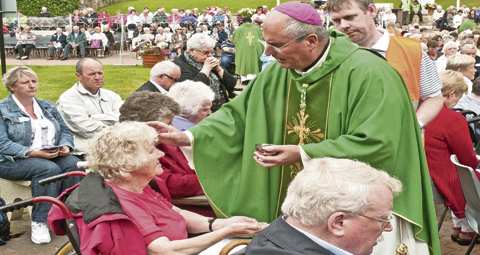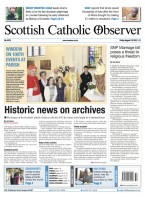July 27 | ![]() 0 COMMENTS
0 COMMENTS ![]() print
print

Protecting the Faith for the future
Glasgow Archbishop-elect Philip Tartaglia will be stepping into his new role with a wealth of experience speaking up for the Faith—and the prayers of Scotland’s Catholics and his fellow bishops—behind him, reports Ian Dunn
Education, youth, communication and protecting the Faith have been at the heart of the new Glasgow Archbishop’s ministry, from his West of Scotland childhood as the eldest of nine children to his role as Bishop of Paisley at World Youth Day in Madrid in 2011 and at The World Meeting of Families in Milan this year to his ongoing fight against the marginalisation of Christianity.
The SCO explores the life of Archbishop-elect Philip Tartaglia, the Bishops’ Conference of Scotland’s Communication bishop, and the journey that has brought him to this point.
Youth and vocation
The new Archbishop of Glasgow was born in the city on January 11, 1951. Philip Tartaglia was the eldest son of Guido and Anita Tartaglia and would eventually see three brothers, including Canon Gerard Tartaglia, and five sisters join his family.
He attended St Thomas’ Primary School, Riddrie and St Mungo’s Academy, Glasgow, before moving to the national junior seminary at St Vincent’s College, Langbank and, later, St Mary’s College, Blairs, Aberdeen with his Ecclesiastical studies completed at the Pontifical Scots College, and the Pontifical Gregorian University in Rome. Ordained a priest by Archbishop Thomas Winning in the Church of Our Lady of Good Counsel, Dennistoun on June 30, 1975, he then returned to Rome, where he completed his ordinary course of studies in 1976 before beginning his research for his Doctorate in Sacred Theology.
Scottish roles
On completing his doctorate in 1980, on the Council of Trent’s teaching on the Eucharist, he was appointed assistant priest at Our Lady of Lourdes, Cardonald, while at the same time becoming an extra-mural lecturer at St Peter’s College, Newlands, Glasgow. Education has been a lasting theme of his vocation and, a year later, he was appointed lecturer at St Peter’s College, Newlands, becoming director of studies in 1983. When Chesters College, Bearsden, opened in 1985 he was made vice-rector. In 1987 he was appointed rector. He held the post of rector until 1993 when he was sent to St Patrick’s, Dumbarton, as assistant priest before being appointed parish priest of St Mary’s, Duntocher in 1995. In 2004, the Bishops’ Conference asked him to return to seminary as rector of the Pontifical Scots College, Rome.
On September 13 2005, it was announced that Fr Philip Tartaglia had been nominated by Pope Benedict XVI as Bishop of Paisley. On November 20 2005, the Solemnity of Christ the King, he was ordained Bishop of Paisley in St Mirin’s Cathedral by Archbishop Mario Conti. The co-consecrating bishops were Archbishop Raymond Burke of St Louis, Missouri, a close friend from Rome, and Bishop John Mone, Emeritus Bishop of Paisley.
Paisley Bishop
Since then he has won many plaudits for his skill and management of Paisley Diocese with a key initiative being his decision to centralise the Sacrament of Confirmation in St Mirin’s Cathedral.
Though sometimes seen as traditionalist, someone who re-established an annual diocesan pilgrimage to Carfin Grotto for example, this move showed he was not afraid to make changes, as he explained just before the first such Confirmations started in 2011.
“I suspect that these may be among the largest events taking place in the Catholic Church in Scotland over the next few weeks,” Bishop Tartaglia said. “To the best of my knowledge, this is the first time in recent history that a Scottish diocese has opted to celebrate Confirmation in this way, bringing all the candidates to the cathedral over a number of Masses so that they may be confirmed by the bishop.”
As that suggests, a focus on youth has also been a key theme of his bishopric and at World Youth day in Sydney in 2009 he told the SCO of some young people he had found to be particularly inspiring.
“One example is truly amazing,” he said. “On the last morning of Catechesis, a group of American young people arrived at the session I was leading just before we started. Later, the priest accompanying the group explained that they were a little bit late because, on their way to the venue, they passed an abortion clinic, and they young people chose to stop and pray the Rosary outside the clinic. What a courageous witness to the sanctity of human life! I told the priest he was indeed fortunate to have young people like those.”
Christianity under attack
This focus on the next generation goes hand-in-hand with his belief that these are days of persecution for Christians in Scotland, a theme he expounded upon for the congregation at St Francis’, Port Glasgow, last year.
He warned that the Bible ‘prophetically’ anticipated many of the contemporary attacks on Christianity.
“Many contemporary voices say that there is no such thing as truth, only your perspective and my perspective,” the bishop said.
“Your opinion and my opinion; voices which say that our Christian and Catholic Faith is a private matter and must not be allowed to influence public policy; voices which say that Christianity must not be allowed to shape how we understand the sacredness of human life, and the nature of marriage and the family; voices which threaten to intrude on the religious truths and moral norms which parents pass on to their children and which our teachers expound in Catholic schools.”
These ‘powerful voices,’ the bishop warned, the ‘voices of politicians and judges and celebrities,’ seek to make Britain a country where ‘Christianity will only be tolerated if it bends to become a religion of the state and a pathetic caricature of itself.’
He has made it clear he is willing to fight for the rights of Christians and Catholics and is not afraid to stand up to the law if it should be required.’
Anti-sectarianism
Bishop Tartaglia took issue with police behaviour at Celtic’s Scottish Premier League match at Aberdeen’s Pittodrie stadium this past season, saying the behaviour of Grampian Police inflamed the crowd.
“We were body searched by stewards under the glare of police, and when we took our seats a police officer started intently filming the Celtic supporters and we were in the middle of them,” he said of the August 7 game last year. “I felt distinctly uncomfortable.”
The bishop said the threatening nature of the surveillance had risked aggravating the crowd.
“The fans had been quiet and good natured, but I could feel the tension growing,” he said. “It was an unnecessary provocation of a peaceful crowd. It was an almost hostile surveillance. It was as if they were saying: ‘We’ve got the power, we can identify you and put you in jail.’ Suddenly, there was a change in the atmosphere and the focus was on the police, instead of the game.”
Archbishop-elect Tartaglia has no fear in taking on the political elite and took on First Minister Alex Salmond over his controversial anti-sectarian legislation. He was keen to ensure that religious liberty was respected and anti- Catholic bigotry was treated as seriously as it deserved to be.
He repeatedly pushed for the publication of the Crown Office analysis of sectarian offences—behaviour, he said, that has ‘no place in a civilised society,’ adding that it made for depressing reading when it emerged that the research recorded 400 religiously motivated crimes against Catholics in the financial year 2010-1011.
“Catholics will take little comfort from the fact that they were previously five times more likely to suffer a sectarian attack than anyone else and are now 4.5 times more likely,” the bishop said. “Since Catholics represent just 16 per cent of Scotland’s population, the fact that they account for almost 60 per cent of the victims of sectarian crime reflects poorly on modern Scotland and is an indicator of entrenched hostility on a worrying scale.”
Future
On meeting with First Minster Salmond on his anti-sectarianism bill, he wryly remarked the politician could ‘charm the birds from the trees’ but the then bishop was still able to extract important concessions on religious freedom.
He was less happy with the First Minister’s plans to legalise same-sex ‘marriage’ however declaring ‘governments do not have the authority to say what marriage is or to change its nature or to decree that people of the same sex can marry.’
This is what the Catholics of Glasgow can expect from their new archbishop, a vigorous defence of their values in the public sphere with a focus on youth and renewal in their Church.
Pic: Paul McSherry











